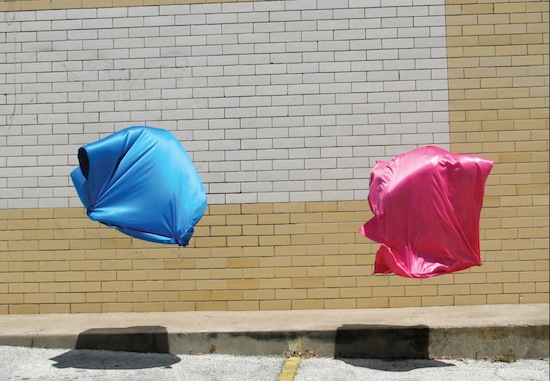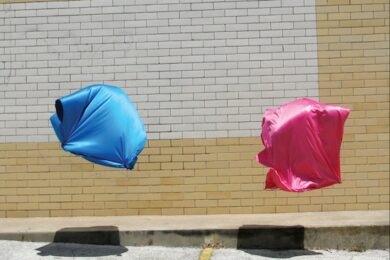1:
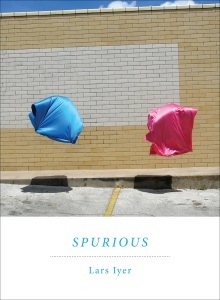
Fittingly enough, it was a friend who introduced me to Lars Iyer’s Spurious. ‘I’m a terrible influence on W., everyone says that. Why does he hang out with me? What’s in it for him?’ At first, I thought it’d be funny to quote that line back to him – ‘Kev’s a terrible influence on me…’ – and so on.
It turned out that I’d soon have much cause to be grateful, though initially I put Spurious among the most claustrophobic books I had ever read. The story concerns two down-at-heel academics, Lars and W., whose only consolation in life – their friendship – feels like a trap. It’s not even that much of a story, really: it’s a static situation produced entirely by repetitions. It lacks even the sitcom’s sense of forward movement. In addition, the narrative voice is an endless harangue delivered by W. against Lars, which Lars relays to us (‘The simplest words are beginning to defeat me, W. says. Maybe it’s mini-strokes, W. speculates’). The words are so hurtful that they go right through him.
Because of the bleak humour and the antagonistic friendship at its centre, the Beckettian touchstone most of us reach for in discussing Spurious is Waiting for Godot. However, the novel lacks the atmosphere of holiness you get with Beckett’s plays, even while giving the same impression of hyperactive movement playing itself out against grey stasis. Mercier and Camier is a closer analogue for the friendship between W. and Lars. There are rapid mood-swings on both sides, and their closeness is uncomfortable, animal: they find themselves together ‘in the chimps’ enclosure’, or else in the metaphysical muckheap of Béla Tarr, or in the mould-infested enclave Lars calls a flat.
The ‘Beckett humour’ is another touchstone in discussions of Iyer’s work. As with Beckett, it’s not funny at first, of course, and that’s part of the beauty of this operation. Both writers raise disturbing questions about humour – when we are introduced to the humorous object, often laughter isn’t our first reaction: maybe we scream in surprise and laugh at it afterwards. Or maybe it’s just a shocked, ‘on-the-knuckle’ gasp. It’s only through repetition that W.’s endless diatribe becomes funny, as rhythms and images recur and become in-jokes with the reader (Lars’s bellowing, his apelike tendencies, the cock songs). This kind of humour dramatises its own assembly, and then makes us watch it in motion while knowing full well how its brutal mechanics work. It’s like an X-ray and a photograph of humour superimposed on one another – and it’s all achieved with such deftness.
Spurious also resembles How It Is, which presents a marsh at once as an imprisonment and the only condition by which communication can take place. It’s hard to tell whether the communication is worth the imprisonment, and, similarly, it’s hard to tell whether friendship is worth the situation which it has been invented to relieve. Moreover, How It Is allows us a means to understand the form of the novel. Apart from initial scene-setting, the majority of the text is one long quotation of W. by Lars, making the encroachment linguistic as well as physical, as in How It Is.
Lars does get to tell us what’s going on, in brief moments where the reported speech breaks into scurries of free indirect speech, and W. just gets to comment on it – but there is a lot more of W. than Lars in the speech. Lars gets to set the scenario up, but W. dominates it. The effect becomes a little dizzying when you realise that it’s the ‘real Lars’, Lars Iyer, who is creating the same situation of containment. Nevertheless, just who is contained in whose speech – W. or Lars – may be ambiguous, but the containment itself is unquestionable.
Lars and W. are in turn subsumed by post-theoretical modes of discourse. Lars can make no better tribute to his friendship than one long, bitty citation, just as much peppered with ‘…, someone says’ as any of my undergraduate essays. Meanwhile, W. doesn’t see ordinary objects: he sees ‘the everyday’; Lars is not Lars, he is ‘the working class’. A ‘W. sentence’ is never less than orotund, and comes decked with italics for meaningless stresses (‘The in– of infinite’) and with clever reversals which don’t actually mean anything. The target is obvious: the ‘poor idiot professor’ whose words are measured out by the hour and not by the amount of thought expressed.
Neither of these are the most discomfiting things about the book, however. If we think of our own friendships, they’re in-jokes, reminiscences, quotations of one another, tellings and retellings. Most of it is speech, the mediation of experience rather than the experience itself. It’s irrevocably phatic: the category in linguistics which deals with phrases like, ‘Well, here we are, talking’. To see the entire script of our friendships would be just as hard to deal with, presumably, as a transcript of our text-messages and status updates. But friendship lacks even that solidity: it’s a textual artefact written on air. All the reiterations and looking back are an attempt to buffer our sense of that fact, as if scurrying upwards from an avalanche.
By presenting friendship in a medium that registers its every chafe and contour, Lars Iyer shows us how delicate and complex every human connection can be. And yet we can feel these tiny, doomed attempts to matter to another begin to become precious precisely because of this same tiny doom. The DNA of friendship is speech, a tissue of words which is endlessly woven into being.
2:
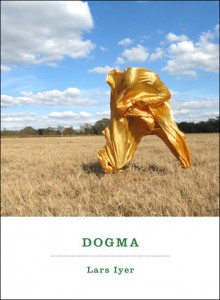
‘Conversation!’, exclaims W. That’s what friendship’s all about.
While at first this same conversation seems dreadfully one-way, Spurious slowly, surely moves from being a book about nothing (or ‘the nothingness of nothing’, as W. might put it) and into the trilogy’s wider movements.
The humour builds into a series of in-jokes about monkey-butlers, cock-songs and ‘That’s you, that is’ (‘You’re nothing but a car’). It’s just as oddly consoling as the in-jokes of a sitcom. And, as well as humour, with repetition comes rhythm. One of the ‘riffs’ in the previous book (along with ‘Old Europe’ and Lars’ ape-like nature) was the characters’ incessant comparison of themselves with Brod. When it recurs in Dogma, it’s with drum-tight timing:
that’s why he got fat. – ‘Why do you think he drank?’, W. asks.
Because he knew he wasn’t Kafka, I tell him.”
Another sequence justifies comparisons with Beckett and comparisons with Thomas Bernhard’s sense of timing. Here, you catch yourself thinking of Endgame (‘Do you believe in the life to come?’ – ‘Mine was always that’), or the Bernhard of ‘The Walker’:
to everyone. No one’s worried about our credentials, because
there are no credentials. There’s only luck. And opportunism.
Were we lucky?, I ask him. – ‘Undoubtedly’. And were we
opportunists? – ‘We were too stupid to be opportunists’.”
The jokes are more rhythmic, and they are no longer embedded in a harangue at Lars’ expense: he’s in on them, and so is the reader. The conversation is enlarging; the trilogy transforming into an argument in favour of the consolation of friendship. That tight circle of Lars and W. encloses the reader now, as if he or she is part of something more than just a book.
As a consequence, the humour is funnier, and warmer, and sadder: ‘I want embroidery! I want fringes!’ Lars shouts to W., in Nashville. W. is tending to Lars’ dream of owning a Nudie suit, ‘or at the very least a Western shirt.’ The sequence comes to an end: ‘But nothing works. I still don’t look like a Rhinestone Cowboy.’ Here, the portent, the sadness veers away from itself, in a bid to efface its poignancy. The joke opens a gap between the situation and the person perceiving it: it’s an escape into nowhere, into an invented gap.
The scenery, too, becomes less claustrophobic. The travelogue here not only repeats W.’s paean to the wide Canadian countryside of his childhood, but dramatises it, too. Again, though, it’s played for laughs, if poignant ones. W. freaks out at a pedestrian crossing and falls into a terror that can only be eased by Plymouth Gin in – fittingly enough – a hot tub. Meanwhile, Lars draws Moby Dick, Huckleberry Finn and the Pequod in the same picture. Here we have the broad humour of Lars playing up to the ‘idiot child’ moniker W. has issued to him, but also something close to a serous point about friendship.
Lars’s naïve art resolves the terrible, mutually destructive struggle of the Pequod against Moby Dick, and includes each of them alongside one half of American literature’s most famous double act. For one weird, ridiculous instant, a ragtag band of literary characters set off down a fake Mississippi. It’s a utopian aspiration of the silliest kind, all the more so for the fact that it’s probably scrawled in violet ink in Lars’ pink ‘Japanese schoolgirl notebook’. It’s probably the closest Lars comes to being a holy fool, and, while he falls short, this episode indicates the serious point made by almost every one of the jokes on show here.
There are serious points at work here, too. Spurious was trapped in dreams of Old Europe, even trying to make a ‘modernist city’ of Plymouth by referring to Abercrombie’s plans for a more open layout. Here, the mood and landscape are apocalyptic: after a lyrical passage on the mighty, capricious Mississippi, W. and Lars stand on its banks and think of America, ‘the deserts that will claim it, the skies that will darken over it’. The landscape is more Max Frisch than Béla Tarr, moving the discussion of apocalypse from a metaphysical plane to that of environmental catastrophe. There has got to be an escape, even if it’s an escape inwards, into the nowhere of jokes and into the dreams of modernism.
The trilogy deepens with Dogma, expanding temporally to include Lars’s years of unemployment, the afternoons of bad television and discounted Tesco sandwiches, the purgatorial hours ‘deep into the time of American cop-show repeats’. Iyer exposes the tiny miseries of unemployment, those complaints which often seem to us to be either too embarrassing or small to merit the mention. The text is becoming political – that is to say, the connections it documents are becoming stronger, including more people and experience in its weave.
The book documents as well as enacts this ‘solidifying’ of human speech into human connection. Just over a third in to Dogma – and so, close to the heart of the trilogy itself – W. and Lars begin their ‘Dogma’ movement out of boredom. By making their friendship a movement, they turn that same friendship into the grounds which underwrite a larger connection. They shout out over the River Cherwell: ‘Your very friendship should depend on what you write. it should mean nothing more than what you write!’ Friendship is no longer to be written on air: it’s to be written down, to be inscribed by actions.
While the movement itself never stops being a vehicle for jokes (some lectures are can-fuelled odysseys, others take the disastrous form of interpretive dance), it also becomes a bit exhilarating to read about. The oddly numb reading texture of Spurious has been electrified: ‘Our second Dogma presentation concerned friendship as a condition of thought’; the seventh features only the word ‘DERELICTION’ on the board, in an image which makes you chuckle as much with excitement as mockery. These are the ‘cool losers’ you find in Sam Lipsyte’s most forgiving moments.
For a little while, it’s a bit like being in a gang, or a band. Then, abruptly, it’s over, without us seeing the ending: ‘Dogma. What did it mean?’ opens one chapter, and that’s the end of Dogma. W. fears for his job. Lars still lives in his mould-eaten flat. Everything was possible for a second, but no longer.
3:
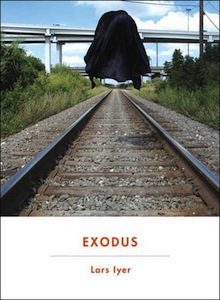
The opening of Exodus is the most sprightly of the three novels. W. gets the rounds in, gets Lars to pay for them, and then slags Lars’ face off for a while. It sets up a rhythm which is the fleetest of all the three books. It reads like a book on a mission: political, ethical, and personal.
The pot-shots come thick and fast, at the privatising, reifying mentality which sees houses ‘named after flowers, after colours, after days of the week’. In order to cope with privatised vistas from which even the homeless have been banished, W. ‘recites the names of Marxist revolutionaries’. As with the work of Sam Jordison, every joke has a serious argument embedded in it, like a razorblade in an apple. The lengthy, almost Chaucerian catalogue of thinkers (thinkers with big beards, thinkers with small beards, thinkers with neckbeards…) plunges us into a scholastically overcrowded universe of the humanities. Another, more scabrous list of ‘introductions to Deleuze’ completes that medieval impression of ever-growing libraries chock-full of commentaries on commentaries. The Japanese knotweed in Lars’ garden, ‘choking our species one by one’, isn’t just a funny prop intended to reinforce the squalor we’ve come to know and love: it picks up the Frischian fears of environmental collapse mentioned in the previous book.
The physical descriptions are employed to document the racketing construction work which leaves landscapes razed (the quadrangle is dug with trenches for pipes ‘like burial pits’) and renders universities bland, anonymous, as interchangeable with one another as the pictures in a prospectus : ‘Yew trees. A grassy expanse. Reading University campus’. We’re in Sebald territory here: a rising tide of noise which gets higher by the day. However, W.’s pompous response to a weather front doesn’t let Sebald off easy: ‘[W]here are we heading, we who walk beneath the shore of clouds?’ Sebald’s famous likening of history to conflicting weather-fronts in Austerlitz gets a bit of a scald: it is at once too ahistorical, and too centred around the human consciousness which responds to history. Iyer has stated his preference for the earlier, more problematic works of Sebald: the moment Sebald drifts into humanistic clichés, he gets slapped down with a satiric deftness which has become honed and muscular over the course of the three books.
This is a very political book, but not in the way in which we have been accustomed to using that word. A ‘political response’, too often, means a kind of Olympian survey of both sides of the story culminating in a hopeful platitude which presents itself as a synthesis. In Dogma, W. quotes Pascal’s ‘place in the sun’ aphorism about a grumpy fellow-player. It’s as if to say that everything which is wrong with society begins with small-scale meanness. In other hands, this might seem like political disgruntlement as personal irritation: the kind of thing that gets resolved in curmudgeonly, talking-heads comedy programmes. With Iyer, though, the argument is always that the political is anything which impacts on another: the response to an appeal from another is the beginning and image of political interaction.
In one sense, this is just the sort of micro-scale thinking which W., with all his sense of the cosmic, world-historical scale of things, ought to be aligning himself against. However, if political hope can be snuffed out by a rude golfer, then it can also be stoked to a blaze from the merest spark. At one point, W. remarks, ‘What is politics but a huddling together for warmth?’ If the short-lived philosophical movement begun in Dogma preached an ethic of friendship, then Exodus puts that ethic into practice. Friendship is the ethic which initiates the political.
In Coetzee’s Summertime, John Coetzee is asked about his political aspirations. ‘Poetry in the streets – that kind of thing,’ he answers. This is the impossible, the necessary dream of Exodus. W. recounts his first meeting with Lars, in Wrocław: ‘Is there such a thing as friendship at first sight?’ Provoked by Lars’s ‘Adam Ant dancing’, W. and ‘the Polish postgraduates’ join him in ‘[that] sense of abandonment that marks pure joy’. It is a ridiculous, a glorious moment in the trilogy. For a second, we glimpse the intrinsic value, the use-value of friendship – not its exchange-value on the tables of ‘networking’. These moments of huddled warmth, these escapes into precisely nowhere: these ethical instants reach out to touch the political moment when friendship is universal. ‘Until then,’ W. says, ‘Even the lushest countryside is a desert. Even the heathery bogs of Dartmoor are but an infinite expanse of sand.’
Another moment typifies this ‘escape into nowhere’. Lars and W. attend a conference on their lecture tour, and spend most of it drawing monkey butlers. And yet:
We felt caught in the updraft of someone else’s ideas. We felt
flown like kites by the thoughts of others. But now we’re tired,
after our day. Our limbs feel heavy; our eyes are closing.’
There’s something of the pharmakon about this paragraph: the period of being ‘high’ on thought, followed by the crippling comedown when the actual exerts itself against the possible and wins. Lars and W. escape not to a place, but for a time. Iyer dramatises the impotence of thought against its context: by means of this contrast, he shows how thought is nothing unless put at the service of friendship. Friendship is the medium by which the ethical becomes the political. The real dream of utopia, Iyer argues – by means of selective quotes from Tronti, among other tactics – is the dream of a time when friendship underwrites politics.
For much of Exodus, the narrative voice veers between the jeremiad and the eulogy: jeremiad, against a society rapidly tearing itself and its thinkers apart; eulogy, for those who pit themselves pointlessly against these same conditions. These are the most powerful passages in the whole trilogy, and the best of them concern ‘the Essex postgraduates’. Here we have queasy lurches outwards from the claustrophobia of Spurious all the way to the endless barrios of a slum planet, infinite vistas of ‘faecal dust [and] open sewers’. These moments are as hot and vivid and frightening as those instants in Roberto Bolaño’s oeuvre when the textual fabric rips to reveals the pulsating horror beneath.
At other moments, W. and Lars stop addressing one another and take it in turns to address an audience which feels like both everybody and the individual holding the book in their hands. These lengthy, monologic sections recall the most striking sections of Howl or Ingeborg Bachmann (the latter of whom is quoted at length). The prose ignites, becomes incantatory, becomes a grad-school Amulet:
Did they lose themselves in the rebuilt Shanghai or in the
favelas of Rio de Janeiro? Did they hole up in the Aleutian
islands to write a magnum opus? Did they wander like
Japanese poets through the stone forests of Yunnan, leaving
traces of their passage in fragments of as yet unwritten
philosophical masterpieces?
The trilogy’s climax features the occupation of Plymouth University, which W. seizes on as his own, personal mai ’68. It doesn’t quite work out that way: not many people are there to hear the speeches, and not many of them who are there understand. Thematically, though, Plymouth is a fitting place to end: Plymouth, of course, is where Lars and W.’s preferred tipple is distilled. They have already taken their hip-flask on a pilgrimage to Dartmoor, from which the gin-waters are distilled, and where you can still see that relic of utopia – last remains of the pre-Enclosure Act ‘commons’ land. As well as several varieties of Plymouth Gin, Lars and W. foist alcoholic distillates from all over ‘Old Europe’ on the Plymouth postgraduates. Drinking and philosophy become conflated. The ‘spirits’ of drink and philosophers merge in a convocation straight out of Don Paterson’s great poem about whiskey-tasting. The academic connotations of the word ‘symposium’ melt off, and we are brought back to the nub of that word’s meaning: companions drinking and talking about companionship.
As we know from Spurious, Plymouth is one of the sites of modernism’s lost potential. It was also the place from which the pilgrims embarked for America while was still their utopia. It was still their utopia because nobody had arrived there: the death of utopia is arrival.
The ‘exodus’ of Exodus, though, never arrives at its destination. That destination remains utopia, and the trilogy fades into something very much like a Guardian Football Minute-by-Minute: a careful tracking of nearly every second, one which immerses the reader so completely in the present of the book that we are all but there.
And there the book stays, and us with it. Exodus hangs there, eternally, like Butch Cassidy and the Sundance Kid – a hope which is forever possible because we never see it crushed: a hope which is nothing, and nowhere, and endless.
I felt sad when Exodus came out, same as I felt sad when the last LCD Soundsystem album came out. When Dogma came out, it became an in-joke between my friends and I: something that bound us together. When we acted that way words became real: they became things we did, rather than something we just read.
It was more than a book: it was a revelation, in that Biblical sense of words being exposed down to their meaning, to the deed in the world to which they referred.
To that end we’d drink Plymouth Gin and say omoi and pallaksch to each other all the time.
The books seemed to be about all my friends. Maybe the experiences weren’t the exact same, but the mood and the situation and the search for consolation certainly were. The books and our gestures constituted a wish for friendship to be more than just words. It was as impossible, as necessary a wish as Larkin’s statues’ unintended assertion that ‘What will survive of us is love’.
What will survive of this book is its account of friendship, its wish for friendship to be real, to be true, to underwrite a social contract – for friendship to be more than just something written on air.
Fittingly enough, it was a friend who introduced me to Lars Iyer’s trilogy.
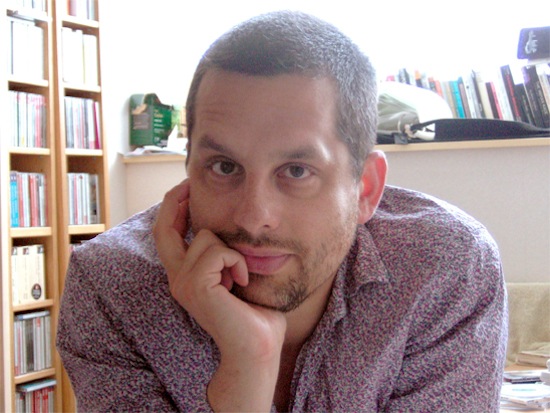
Spurious, Dogma and Exodus are available now, published by Melville House
Follow @theQuietusBooks on Twitter for more

